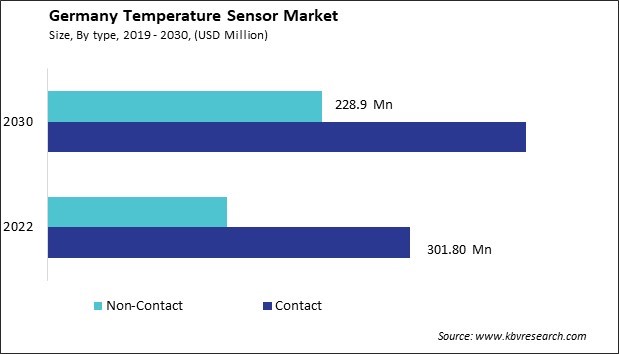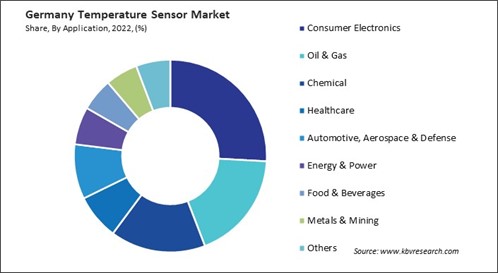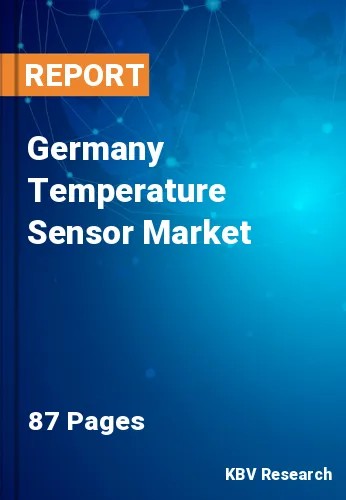The Germany Temperature Sensor Market size is expected to reach $627.0 million by 2030, rising at a market growth of 4.3% CAGR during the forecast period. In the year 2022, the market attained a volume of 6,182.5 thousand units, experiencing a growth of 4.0% (2019-2022).
The temperature sensor market in Germany is experiencing a substantial growth trajectory driven by diverse factors that span various industries. As technology advances and industries increasingly rely on accurate temperature monitoring, the demand for temperature sensors has surged, making Germany a focal point for industry expansion.

Furthermore, the healthcare and pharmaceutical industries contribute significantly to the growing demand for temperature sensors. The stringent temperature requirements for storing and transporting vaccines, medicines, and biological samples necessitate using highly accurate and reliable temperature monitoring systems in Germany. As these industries expand and become more regulated, the demand for advanced temperature-sensing technologies is expected to increase.
Another significant factor is the rise of the Internet of Things (IoT) and the smart home trend in Germany. Smart thermostats, climate control systems, and home appliances increasingly incorporate temperature sensors to give users more efficient and personalized control over their environments. The growing adoption of smart home technologies in Germany fuels the demand for temperature sensors as consumers seek more sophisticated and connected home solutions.
According to the Germany Trade and Invest, the Internet of Things (IoT) sector is anticipated to witness substantial growth, with projected spending surpassing EUR 35 billion, positioning Germany as the leading spender in Europe. Concurrently, the turnover generated by IoT is poised to double, transitioning from EUR 22.5 billion in 2018 to an estimated EUR 45 billion by 2023. This surge underscores the significant expansion and opportunities within the temperature sensor market as a pivotal component of Germany's burgeoning IoT landscape.
Germany has witnessed a significant surge in the use of thermocouples within the temperature sensor market, reflecting a broader trend towards advanced and reliable temperature measurement technologies. Thermocouples have gained prominence due to their versatility, robustness, and ability to operate in extreme conditions, making them indispensable in various industrial applications. Thermocouples are crucial in optimizing energy production processes and ensuring the safety and efficiency of solar panels, wind turbines, and other renewable energy infrastructure.
One key driver behind the rise of thermocouples in Germany is their widespread adoption in manufacturing and industrial processes. Thermocouples excel in environments with high temperatures, aggressive chemicals, and mechanical stresses, providing a durable and accurate solution for temperature monitoring. Industries such as automotive, chemical, and metallurgy have increasingly integrated thermocouples into their operations to ensure precise temperature control, enhance process efficiency, and guarantee product quality.
The demand for thermocouples has also been bolstered by advancements in sensor technology in Germany, leading to improved accuracy and reliability. Manufacturers have developed innovative thermocouple designs and materials, expanding their applicability across diverse sectors. This has fueled the uptake of thermocouples in research and development activities, laboratories, and specialized applications where precise temperature measurements are paramount. Therefore, the surge in thermocouple usage in Germany's temperature sensor market is driven by their adaptability to extreme conditions, playing a vital role in industrial processes, energy optimization, and technological advancements.
In recent years, Germany has witnessed a significant surge in the adoption of industrial automation in the temperature sensor market. This trend is attributed to factors that underscore the country's commitment to technological advancement, efficiency improvement, and sustainability goals. One of the key drivers behind the increased adoption of industrial automation in the temperature sensor market is the German industries' relentless pursuit of operational excellence. As manufacturing processes become more complex and demanding, there is a heightened need for precise and real-time monitoring of temperature conditions. Industrial automation and advanced temperature sensors enable companies to achieve unparalleled control over their processes, ensuring optimal efficiency and product quality.
The industry 4.0 initiative originated in Germany and has played a pivotal role in shaping the industrial landscape. This initiative emphasizes the integration of digital technologies, automation, and data exchange in manufacturing processes. As integral components of this paradigm, temperature sensors contribute to creating smart factories where machines communicate seamlessly, leading to enhanced productivity and reduced downtime. The automotive and manufacturing sectors, pillars of the German economy, have been at the forefront of embracing industrial automation for temperature sensing applications. The automotive industry, in particular, relies on temperature sensors for various critical functions, including engine monitoring and climate control.
Thus, the increasing adoption of industrial automation in the temperature sensor market in Germany is a testament to the country's forward-looking approach to technology and efficiency. As industries prioritize precision, productivity, and sustainability, integrating advanced temperature sensing technologies within automated systems is poised to play a pivotal role in shaping the future of manufacturing in Germany.

Germany is a global industrial manufacturing and technology powerhouse, and the temperature sensor market is no exception. Local companies in Germany play a crucial role in developing and supplying cutting-edge temperature sensing solutions for a wide range of industries, including automotive, healthcare, manufacturing, and environmental monitoring.
One prominent player in the German temperature sensor market is Infineon Technologies AG. As a leading semiconductor manufacturer, Infineon produces a variety of sensors, including temperature sensors, that are essential components in automotive electronics, industrial applications, and consumer electronics. Infineon's innovative sensor technologies contribute to the efficiency and reliability of systems, enabling advancements in electric vehicles, smart factories, and other high-tech applications.
Another notable company is TDK Corporation, which operates through its subsidiary, TDK-Micronas. TDK-Micronas specializes in sensor and actuator solutions focusing on automotive and industrial applications. The company's expertise in Hall sensors, magnetic sensors, and temperature sensors has positioned it as a key player in the German industry, addressing the growing demand for reliable and high-performance sensor solutions in various industries.
Sensirion AG is a Swiss company with a significant presence in the German industry. Known for its sensor expertise, Sensirion develops and manufactures a wide range of environmental sensors, including temperature sensors. Their sensors find applications in medical technology, automotive, and consumer goods. The company's commitment to miniaturization and energy efficiency has made its sensors integral to IoT devices and wearables advancements.
E+E Elektronik GmbH, based in Engerwitzdorf, Austria, is a noteworthy participant in the German temperature sensor market. E+E Elektronik specializes in high-precision sensors for measuring humidity, temperature, and CO2. The company's sensors cater to critical applications in HVAC (heating, ventilation, and air conditioning), industrial automation, and cleanroom environments, showcasing their commitment to accuracy and reliability.
By Type
By Application
Our team of dedicated experts can provide you with attractive expansion opportunities for your business.

